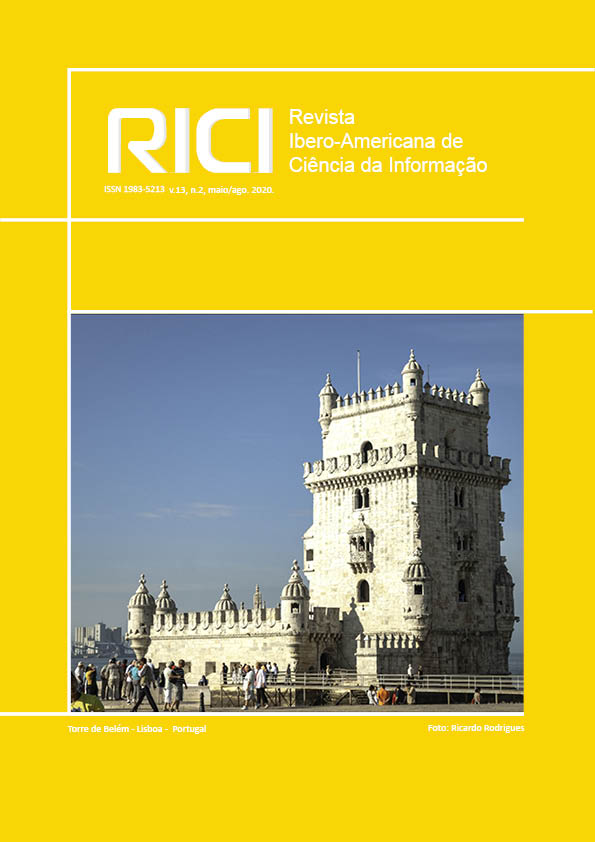Memory and Orality: the viola singing and storytelling in the Cariri region from Ceará
DOI:
https://doi.org/10.26512/rici.v13.n2.2020.28269Keywords:
Memory. Storytelling. viola singing. Ceará.Abstract
It Considers that memory is responsible for the remembrance and knowledge which helps on the construction of the society culture. It Highlights the story telling and the viola singing as manifestations which take advantage of memory to keep themselves alive and to dissociate the (local) culture as a propagation of the own practice of transmitted information through its performance (verses and stories). It questions what approximate these cultural practices, how they are identify and construct themselves in the local conjecture. It aims at elucidating the dialogue produced and expressed from the relations between tradition and orality being the memory the demarcation of the continuity of generations, a way of reaffirming the cultural values of Cariri from Ceará and the contribution of this memory in the construction of individual and collective stories. It analyzes the literature on the topic, considering that both the story telling as the viola singing congregate, in relation to their actors and their oeuvre, a repository of memories of their generation, their people, becoming elements of representation and society connection and its social, economic, political and cultural facets.
Downloads
References
CALDIN, C. F. Voz, presença e imaginação: a narração de histórias e as crianças pequenas. Encontros Bibli Revista Eletrônica de Biblioteconomia e Ciência da Informação, Florianópolis, v. 7, p. 25-38, 2002.
CARIRY, R. Cariri: a nação das utopias. Fortaleza, 2001.
FREIRE, P. A importância do ato de ler: três artigos que se completam. São Paulo: Cortez, 1989.
FERNANDES, D. L. A literatura infantil. São Paulo: Edições Loyola, 2003.
HANKE, Michael. Narrativas orais: formas e funções. Contracampo (UFF), Rio de Janeiro, v. 7, p. 117-126, 2003.
HOLANDA, L. Memória: multiplicidade e permanência. IRIS: Revista de Informação, Memória e Tecnologia, Recife, v. 1, n. 1, p. 17-25, jul./dez. 2012. Disponível em: <http://www.repositorios.ufpe.br/revistas/index.php/IRIS/article/view/7/12>. Acesso em: 15 abr. 2019.
JAKOBSON, R. Linguística e poética. In: JAKOBSON, R. Linguística e comunicação. São Paulo: Cultrix, 1991.
LE COADIC, Y. A ciência da informação. Brasília: Briquet de Lemos/Livros, 1994. 122 p.
LEMAIRE, R. Repensando a história literária. In: HOLLANDA, Heloísa Buarque de (org.). Tendências e impasses. O feminismo como crítica da cultura. Rio de Janeiro: Rocco, 1994.
LEMAIRE, R. “Tradições que se refazem”. Revista Estudos de Literatura Brasileira Contemporânea, Brasília, n. 35, p. 17-30, jan./jun. 2010,. Disponível em: <http://www.gelbc.com.br/pdf_revista/3501.pdf> Acesso em: 15 abr. 2019.
LIMA, D. F.C. Herança cultural (re)interpretada ou a memória e a instituição museu releitura e reflexões. Museologia e Patrimônio. Rio de Janeiro, v. 1, n. 1, p. 33-43, jul./dez. 2007.
MATOS, G. A, SORSY, L. O ofício do contador de histórias. São Paulo: Martins Fontes, 2005.
MONTEIRO, S. D. CARELLI, A. E. PICKLER, M. E. V. A Ciência da Informação, Memória e Esquecimento. DataGramaZero -Revista de Ciência da Informação. Rio de Janeiro, v. 9, n. 6, dez. 2008. Disponível em: <http://www.dgz.org.br/dez08/Art_02.htm> Acesso em: 15 abr. 2019.
ONG, W. J. Oralidade e cultura escrita: a tecnologização da palavra. São Paulo: Papirus, 1998.
RAMOS, A. C. Contação de histórias: um caminho para a formação de leitores? Dissertação de Mestrado em Educação. Universidade Estadual de Londrina, 2011.
RAMALHO, E. B. Cantoria nordestina: pensando uma estética da cultura oral. Ensaio à Universidade Estadual do Ceará, 2001. Disponível em <http://www.iaspmal.net/wp-content/uploads/2011/12/Ramalho.pdf>. Acesso em: 15 abr. 2019.
RODRIGUES, L. G. A arte das narrativas orais urbanas: performance, história, memória e ficção. Porto Alegre: UFRGS, 2010.
SÁ, P. I. B.; BUFREM, L. S. O registro da cantoria de viola enquanto informação memorialística e sua contradição. In: ENCONTRO NACIONAL DE PESQUISA EM CIÊNCIA DA INFORMAÇÃO,12., GT 10. Salvador, 2016. Anais...Salvador: Universidade Federal da Bahia, 2016.
SÁ, P. I. B. A cantoria de viola como registro de memória e disseminação de informação na região do Cariri: legitimação e contradição. Dissertação (Mestrado), Universidade Federal de Pernambuco, Centro de Artes e Comunicação. Ciência da Informação, 2017.
SAUTCHUK, J. M. M. A Poética do Improviso: prática e habilidade no repente nordestino. Tese (apresentada ao Departamento de Antropologia da Universidade de Brasília para obtenção do Título de Doutor em Antropologia). Brasília (DF): 2009. Disponível em <http://repositorio.unb.br/bitstream/10482/5091/1/Tese%20DAN-BCE.pdf> Acesso em: 15 abr. 2019.
SOUSA, A. L. M. Contações de história na região do Cariri Cearense: memória, identidade cultural e a mediação da leitura. Dissertação de Mestrado em Ciência da Informação. Universidade Federal do Pernambuco. 2017.
TAHAN, M. A arte de ler e contar histórias. Rio de Janeiro: Conquista, 1961.
TAVARES, B. Função da música na cantoria de viola. Synergies Brésil, n. 9, 2011.
ZUMTHOR, P. A letra e a voz: a literatura medieval. São Paulo: Cia. Das Letras, 1993.
ZUMTHOR, P. Introdução à poesia oral. São Paulo: Educ/Hucitec, 1997.
ZUMTHOR, P. Escritura e nomadismo. São Paulo: Ateliê, 2005.
ZUMTHOR, P. Performance, recepção e leitura. São Paulo: Cosac Naify, 2007.
Downloads
Published
How to Cite
Issue
Section
License
Copyright (c) 2020 Ana Lívia Mendes de Sousa, Paloma Israely Barbosa de Sá, Leilah Santiago Bufrem

This work is licensed under a Creative Commons Attribution 4.0 International License.
Copyright Notice
Authors who publish in this journal agree to the following terms:
- Authors retain copyright and grant the journal right of first publication with the work simultaneously licensed under the Creative Commons Attribution License 4.0, allowing the sharing of work and recognition of the work of authorship and initial publication in this journal.
- Authors are able to take on additional contracts separately, non-exclusive distribution of the version of the paper published in this journal (ex.: distribute to an institutional repository or publish as a book), with an acknowledgment of its initial publication in this journal.
- Authors are permitted and encouraged to distribute their work online (eg.: in institutional repositories or on their website) at any point before or during the editorial process, as it can lead to productive exchanges, as well as increase the impact and citation the published work.
















